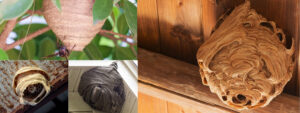 Wasps often evoke a sense of unease among homeowners, especially during wasp season. However, understanding their crucial role in the ecosystem can help foster a more harmonious coexistence. These industrious insects contribute significantly to natural pest control by preying on other insects, thus maintaining a balanced environment.
Recognizing the different types of wasp nests and their characteristics is essential for ensuring your home remains a safe and comfortable space. By implementing expert-approved strategies, it is possible to keep wasps away while appreciating their ecological importance.
With a focus on safety and environmental responsibility, our Truly Nolen experts aim to equip you with the knowledge and confidence to manage wasp presence effectively, ensuring peace of mind and a harmonious living environment.
Wasps often evoke a sense of unease among homeowners, especially during wasp season. However, understanding their crucial role in the ecosystem can help foster a more harmonious coexistence. These industrious insects contribute significantly to natural pest control by preying on other insects, thus maintaining a balanced environment.
Recognizing the different types of wasp nests and their characteristics is essential for ensuring your home remains a safe and comfortable space. By implementing expert-approved strategies, it is possible to keep wasps away while appreciating their ecological importance.
With a focus on safety and environmental responsibility, our Truly Nolen experts aim to equip you with the knowledge and confidence to manage wasp presence effectively, ensuring peace of mind and a harmonious living environment.
The Ecological Role of Wasps
Wasps are more than just unwelcome guests at summer picnics; they play a crucial role in maintaining ecological balance. They are natural predators of many garden pests like caterpillars, aphids, and other insects that can damage plants. By controlling these populations, wasps indirectly support plant health and biodiversity. Additionally, some species are pollinators, contributing to the growth of flowers and crops. Understanding the positive impact of wasps on our environment can help us coexist with them more harmoniously. However, it's also important to recognize when their presence becomes a problem and how to address it effectively. Beyond their predatory and pollinating roles, wasps also contribute to nutrient cycling by breaking down organic matter and serving as food for other wildlife. This complex interplay within the ecosystem underscores their importance. Educating ourselves about these beneficial aspects can reduce unnecessary fear and promote strategies that foster peaceful coexistence while ensuring our safety and comfort.Identifying Different Types of Wasp Nests
Knowing what type of nest you're dealing with is the first step in managing their presence. In Toronto, common species include paper wasps, yellowjackets, and hornets. Each has distinct nesting habits:- Paper Wasps: These wasps construct open, umbrella-shaped nests often found hanging from eaves, branches, or window frames. They are generally less aggressive unless their nest is threatened.
- Yellowjackets: Yellowjackets build enclosed nests, which can be found underground, in wall cavities, or in dense shrubbery. They are more aggressive, especially in late summer and fall.
- Hornets: Hornet nests are large, rounded, and enclosed, typically found in trees or on the sides of buildings. Hornets are highly defensive of their nests and can be quite aggressive when disturbed.
- Mud Daubers: Mud daubers construct small, tube-like nests made of mud, which are often found on sheltered surfaces like eaves, walls, and ceilings. These wasps are solitary and rarely aggressive, focusing primarily on hunting spiders to provision their nests.
- Bald-faced Hornets: Bald-faced hornets create large, papery nests that are typically suspended from trees or high structures. These nests can reach the size of a basketball and are often greyish in colour. Bald-faced hornets are fiercely protective of their nests and can be highly aggressive when they feel threatened.
- Digger Wasps: These wasps excavate nests in sandy soil, making them commonly found in gardens, lawns, or sandy pathways. Digger wasps are solitary and generally non-aggressive, spending most of their time hunting insects to place in their burrows as food for their larvae.

Strategies to Keep Wasps Away
To ensure a safe and comfortable living environment while respecting the important ecological role of wasps, it is essential to adopt effective preventive measures. Here are some expert-recommended strategies:- Seal Potential Entry Points: Inspect your home for any cracks or gaps in walls, windows, doors, and eaves. Sealing these entry points with caulking or weather stripping can prevent wasps from entering your living space.
- Remove Attractants: Wasps are drawn to food sources, particularly sugary substances. Ensure that food and drinks are covered when outdoors, and promptly clean up spills and crumbs. Trash bins should have tightly fitting lids and be emptied regularly.
- Maintain Garden and Outdoor Spaces: Keep your garden tidy by regularly trimming plants and removing fallen fruit. This reduces the food sources that can attract wasps. Additionally, cover compost piles and keep outdoor cooking areas clean.
- Install Wasp Traps: Commercial traps can be effective in reducing wasp populations. Place these traps away from high-traffic areas to lure wasps away from your home. Be sure to check and empty the traps as needed.
- Use Natural Repellents: Certain plants, such as mint, eucalyptus, and citronella, can naturally repel wasps. Consider planting these around your home and garden to deter wasp activity.
- Professional Pest Control Services: If wasp activity becomes unmanageable, it is prudent to consult with professional pest control services. Our Truly Nolen experts are equipped with the knowledge and tools to safely and effectively manage infestations, ensuring your home remains a peaceful and safe environment.

